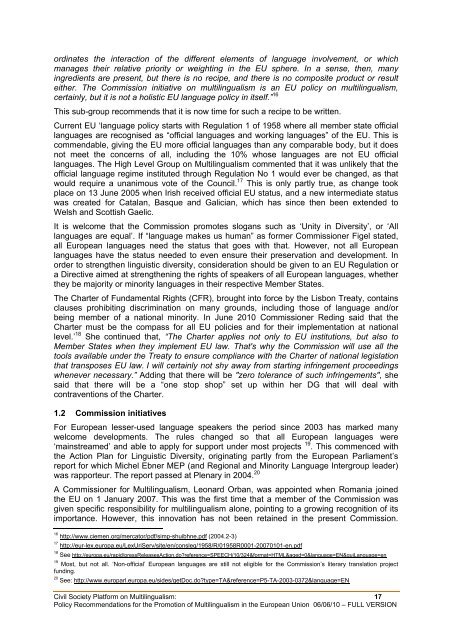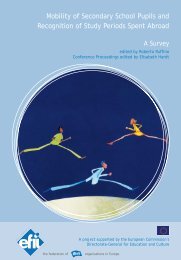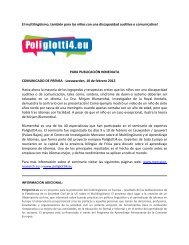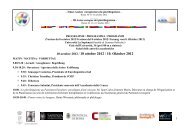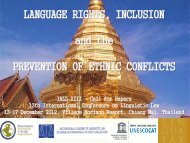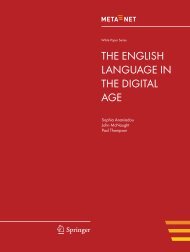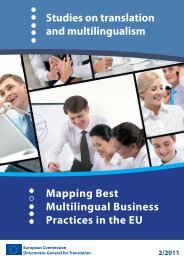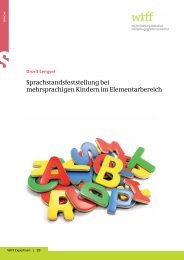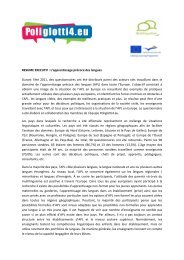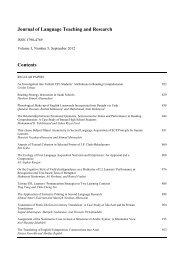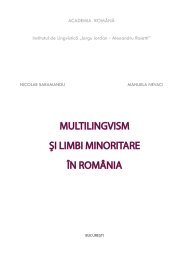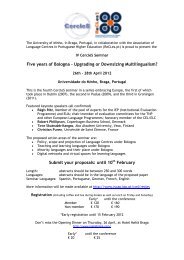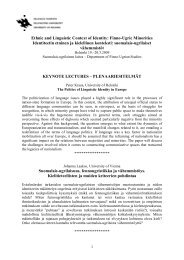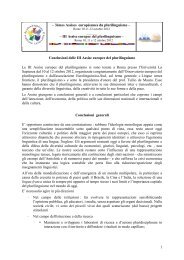FULL VERSION - European Commission - Europa
FULL VERSION - European Commission - Europa
FULL VERSION - European Commission - Europa
Create successful ePaper yourself
Turn your PDF publications into a flip-book with our unique Google optimized e-Paper software.
ordinates the interaction of the different elements of language involvement, or whichmanages their relative priority or weighting in the EU sphere. In a sense, then, manyingredients are present, but there is no recipe, and there is no composite product or resulteither. The <strong>Commission</strong> initiative on multilingualism is an EU policy on multilingualism,certainly, but it is not a holistic EU language policy in itself.” 16This sub-group recommends that it is now time for such a recipe to be written.Current EU ‘language policy starts with Regulation 1 of 1958 where all member state officiallanguages are recognised as “official languages and working languages” of the EU. This iscommendable, giving the EU more official languages than any comparable body, but it doesnot meet the concerns of all, including the 10% whose languages are not EU officiallanguages. The High Level Group on Multilingualism commented that it was unlikely that theofficial language regime instituted through Regulation No 1 would ever be changed, as thatwould require a unanimous vote of the Council. 17 This is only partly true, as change tookplace on 13 June 2005 when Irish received official EU status, and a new intermediate statuswas created for Catalan, Basque and Galician, which has since then been extended toWelsh and Scottish Gaelic.It is welcome that the <strong>Commission</strong> promotes slogans such as ‘Unity in Diversity’, or ‘Alllanguages are equal’. If “language makes us human” as former <strong>Commission</strong>er Figel stated,all <strong>European</strong> languages need the status that goes with that. However, not all <strong>European</strong>languages have the status needed to even ensure their preservation and development. Inorder to strengthen linguistic diversity, consideration should be given to an EU Regulation ora Directive aimed at strengthening the rights of speakers of all <strong>European</strong> languages, whetherthey be majority or minority languages in their respective Member States.The Charter of Fundamental Rights (CFR), brought into force by the Lisbon Treaty, containsclauses prohibiting discrimination on many grounds, including those of language and/orbeing member of a national minority. In June 2010 <strong>Commission</strong>er Reding said that theCharter must be the compass for all EU policies and for their implementation at nationallevel.’ 18 She continued that, “The Charter applies not only to EU institutions, but also toMember States when they implement EU law. That's why the <strong>Commission</strong> will use all thetools available under the Treaty to ensure compliance with the Charter of national legislationthat transposes EU law. I will certainly not shy away from starting infringement proceedingswhenever necessary.” Adding that there will be "zero tolerance of such infringements", shesaid that there will be a “one stop shop” set up within her DG that will deal withcontraventions of the Charter.1.2 <strong>Commission</strong> initiativesFor <strong>European</strong> lesser-used language speakers the period since 2003 has marked manywelcome developments. The rules changed so that all <strong>European</strong> languages were‘mainstreamed’ and able to apply for support under most projects 19 . This commenced withthe Action Plan for Linguistic Diversity, originating partly from the <strong>European</strong> Parliament’sreport for which Michel Ebner MEP (and Regional and Minority Language Intergroup leader)was rapporteur. The report passed at Plenary in 2004. 20A <strong>Commission</strong>er for Multilingualism, Leonard Orban, was appointed when Romania joinedthe EU on 1 January 2007. This was the first time that a member of the <strong>Commission</strong> wasgiven specific responsibility for multilingualism alone, pointing to a growing recognition of itsimportance. However, this innovation has not been retained in the present <strong>Commission</strong>.16http://www.ciemen.org/mercator/pdf/simp-shuibhne.pdf (2004.2-3)17http://eur-lex.europa.eu/LexUriServ/site/en/consleg/1958/R/01958R0001-20070101-en.pdf18See http://europa.eu/rapid/pressReleasesAction.do?reference=SPEECH/10/324&format=HTML&aged=0&language=EN&guiLanguage=en19Most, but not all. ‘Non-official’ <strong>European</strong> languages are still not eligible for the <strong>Commission</strong>’s literary translation projectfunding.20See: http://www.europarl.europa.eu/sides/getDoc.do?type=TA&reference=P5-TA-2003-0372&language=ENCivil Society Platform on Multilingualism: 17Policy Recommendations for the Promotion of Multilingualism in the <strong>European</strong> Union 06/06/10 – <strong>FULL</strong> <strong>VERSION</strong>


